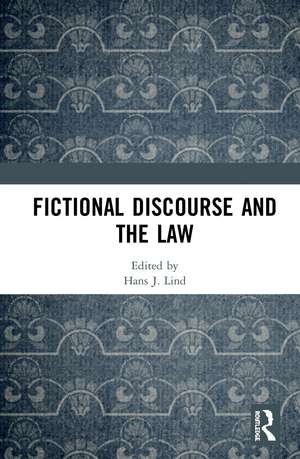Fictional Discourse and the Law
Editat de Hans J. Linden Limba Engleză Hardback – 27 apr 2020
Pursuing an empirical approach, and using examples that range from Victorian literature to the current judicial treatment of rap music, the volume challenges the prevailing fact–fiction dichotomy in legal theory and practice by providing a better understanding of the peculiarities of legal fictionality, while also contributing further material to fictional theory’s endeavor to find a transdisciplinary valid criterion for a definition of fictional discourse. Following the basic presumptions of the early law-as-literature movement, past approaches have mainly focused on textuality and narrativity as the common denominators of law and literature, and have largely ignored the topic of fictionality. This volume provides a much needed analysis of this gap.
The book will be of interest to scholars of legal theory, jurisprudence and legal writing, along with literature scholars and students of literature and the humanities.
| Toate formatele și edițiile | Preț | Express |
|---|---|---|
| Paperback (1) | 387.58 lei 6-8 săpt. | |
| Taylor & Francis – 13 dec 2021 | 387.58 lei 6-8 săpt. | |
| Hardback (1) | 768.46 lei 6-8 săpt. | |
| Taylor & Francis – 27 apr 2020 | 768.46 lei 6-8 săpt. |
Preț: 768.46 lei
Preț vechi: 1105.29 lei
-30% Nou
Puncte Express: 1153
Preț estimativ în valută:
147.09€ • 159.83$ • 123.64£
147.09€ • 159.83$ • 123.64£
Carte tipărită la comandă
Livrare economică 22 aprilie-06 mai
Preluare comenzi: 021 569.72.76
Specificații
ISBN-13: 9781138604759
ISBN-10: 1138604755
Pagini: 284
Dimensiuni: 156 x 234 x 19 mm
Greutate: 0.69 kg
Ediția:1
Editura: Taylor & Francis
Colecția Routledge
Locul publicării:Oxford, United Kingdom
ISBN-10: 1138604755
Pagini: 284
Dimensiuni: 156 x 234 x 19 mm
Greutate: 0.69 kg
Ediția:1
Editura: Taylor & Francis
Colecția Routledge
Locul publicării:Oxford, United Kingdom
Cuprins
Table of Contents
Acknowledgments
List of contributors
Part I. From Narrative to Fiction in Legal Theory and Practice
Chapter 1 Theorizing Fictional Discourse: Toward a Re-Assessment of the Fact-Fiction-Dichotomy in Legal Theory and Practice (Hans Lind)
Part II. The Ubiquity of Fictional Discourse in Legal Theory and Practice
Chapter 2.1 Fictions of Constitutional Privacy: Toward a Linguistic Subject (Cynthia Merrill)
Chapter 2.2 Adultery, Criminality and the Fiction of the King's Body (Erin Sheley)
Chapter 2.3 Memory, History, and Forgetting: Shelby County v. Alabama (Laura Cisneros)
Chapter 2.4. Deconstructing the Fiction of Contract (Tal Kastner)
Part III. A Matter of Evidence? Fact and Fiction in the Courtroom
Chapter 3.1 Dying Declarations (Peter Brooks)
Chapter 3.2 Rap as Courtroom Reality (Hans Lind)
Chapter 3.3 Fiction as Courtroom Fact? Exploration Accounts as Evidence in Aboriginal Rights and Title Litigation (Luis Campos)
Part IV: Fictional Discourse as Law’s Mirror and Cradle: Metafictional Qualities of Law in Literature
Chapter 4.1 ‘A Fearful and Wonderful Institution’: Representing Law in Sensational Novels (Sara Murphy)
Chapter 4.2 Fictions of Corporate Intention: The Epistemological Problem of the Good Corporation (Lisa Siraganian)
Chapter 4.3 Remedial Fictions: The Novelization of Habeas Corpus and the History of Human Rights (Sarah Winter)
Part V: Fictional Discourse and the Law: A Theoretical Perspective
Chapter 5.1 Legal Fictions and Legal Fabrication (Simon Stern)
Chapter 5.2 Linguistic Fictions and Legal Rule (Hans Lind)
Chapter 5.3 Cognitive Fictionalizing and Legal Legitimacy (Karen Petroski)
Chapter 5.4 Law as Authoritative Fiction (Andrei Marmor)
Acknowledgments
List of contributors
Part I. From Narrative to Fiction in Legal Theory and Practice
Chapter 1 Theorizing Fictional Discourse: Toward a Re-Assessment of the Fact-Fiction-Dichotomy in Legal Theory and Practice (Hans Lind)
Part II. The Ubiquity of Fictional Discourse in Legal Theory and Practice
Chapter 2.1 Fictions of Constitutional Privacy: Toward a Linguistic Subject (Cynthia Merrill)
Chapter 2.2 Adultery, Criminality and the Fiction of the King's Body (Erin Sheley)
Chapter 2.3 Memory, History, and Forgetting: Shelby County v. Alabama (Laura Cisneros)
Chapter 2.4. Deconstructing the Fiction of Contract (Tal Kastner)
Part III. A Matter of Evidence? Fact and Fiction in the Courtroom
Chapter 3.1 Dying Declarations (Peter Brooks)
Chapter 3.2 Rap as Courtroom Reality (Hans Lind)
Chapter 3.3 Fiction as Courtroom Fact? Exploration Accounts as Evidence in Aboriginal Rights and Title Litigation (Luis Campos)
Part IV: Fictional Discourse as Law’s Mirror and Cradle: Metafictional Qualities of Law in Literature
Chapter 4.1 ‘A Fearful and Wonderful Institution’: Representing Law in Sensational Novels (Sara Murphy)
Chapter 4.2 Fictions of Corporate Intention: The Epistemological Problem of the Good Corporation (Lisa Siraganian)
Chapter 4.3 Remedial Fictions: The Novelization of Habeas Corpus and the History of Human Rights (Sarah Winter)
Part V: Fictional Discourse and the Law: A Theoretical Perspective
Chapter 5.1 Legal Fictions and Legal Fabrication (Simon Stern)
Chapter 5.2 Linguistic Fictions and Legal Rule (Hans Lind)
Chapter 5.3 Cognitive Fictionalizing and Legal Legitimacy (Karen Petroski)
Chapter 5.4 Law as Authoritative Fiction (Andrei Marmor)
Notă biografică
Hans Jochen Lind (Ph.D. Yale University) is a Lecturer and, since 2003, Attorney-at-Law. He teaches German Literature, Theatre Studies and Media Studies at Yale University and at Vienna University’s Institute for Theatre, Film and Media Studies. He was a Fulbright Scholar (2004–2005) and a Giamatti-Fellow at Yale University (2005–2006), and later acted as coordinator of the Yale Whitney Humanities Center’s working group "Fictionality – Interdisciplinary Approaches. Law – Literature – Science" (2010–2013). Legal clerking included the 5th Civil Chamber of Appeal (Law Clerk to Presiding Judge Basel).
Descriere
Drawing on insights from literary theory and analytical philosophy, this book analyzes the intersection of law and literature from the distinct and unique perspective of fictional discourse.
